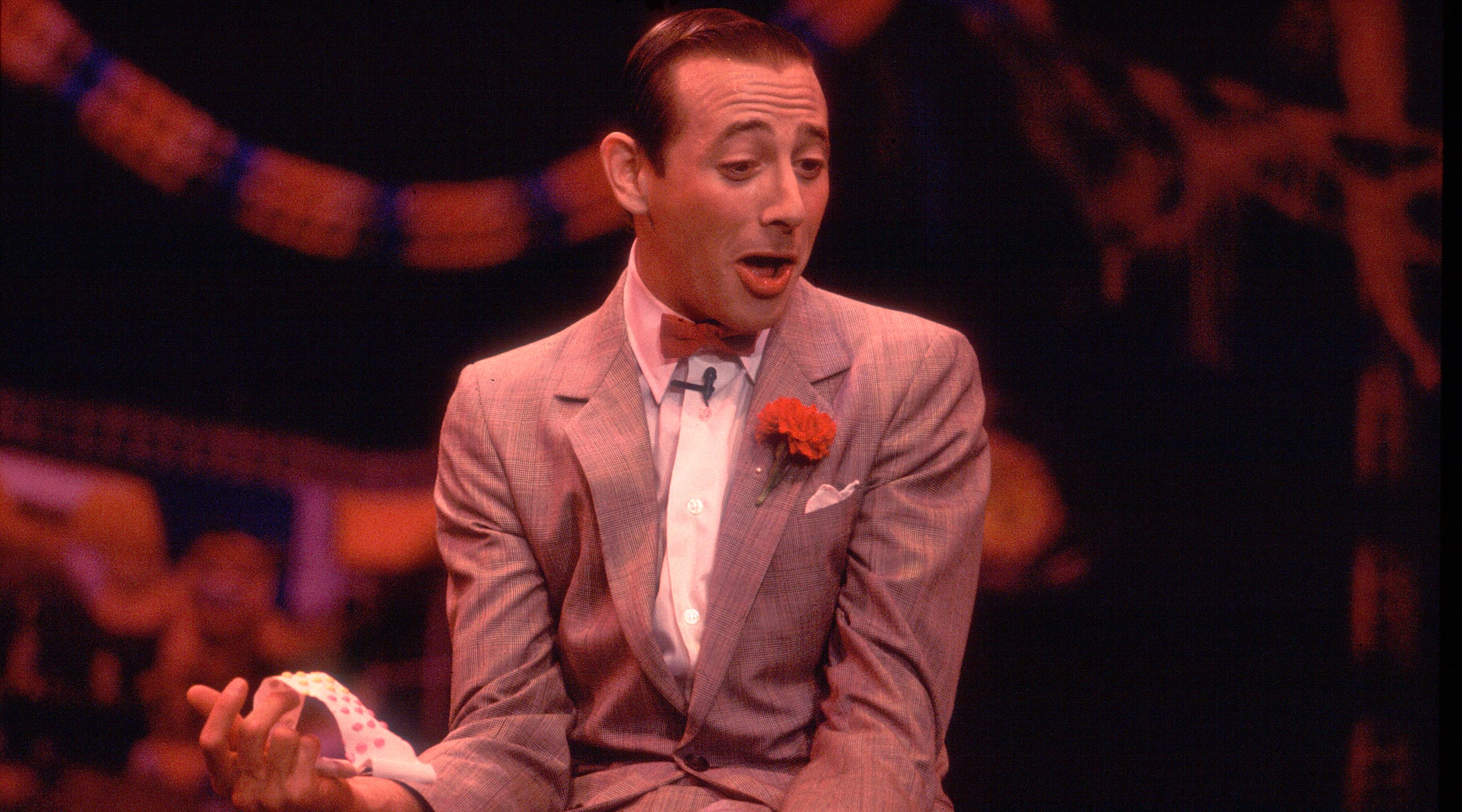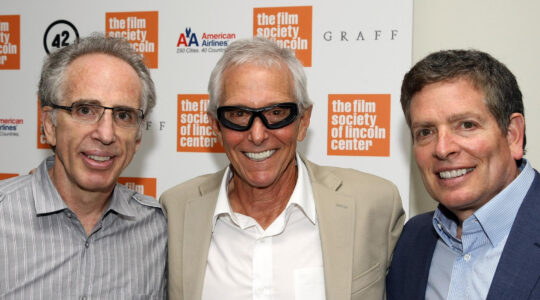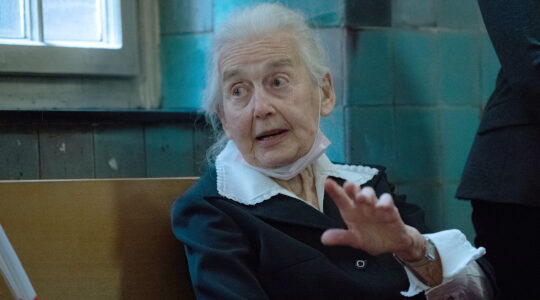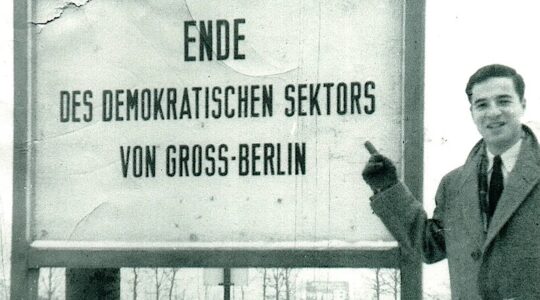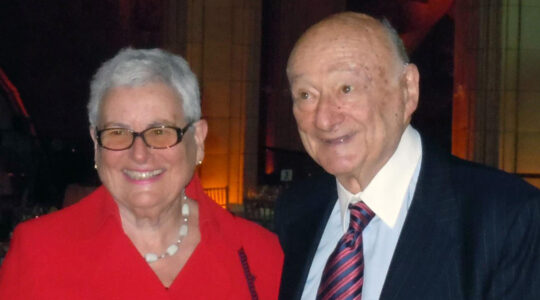(JTA) — I was just out of college when I got a freelance assignment from a small entertainment magazine to interview a rising comic named Pee-wee Herman.
Of course that wasn’t his real name, but the man-child persona — one part Howdy Doody, one part third-grade nerd, who spoke as if he just took a hit off a helium balloon — created by a comic and actor named Paul Reubens.
The publicist warned me that Reubens would be only talking to me as Pee-wee, but the voice at the other end of the call spoke in a flat, polite baritone. It was Reubens as Reubens, who had decided to drop the Pee-wee character, at least for our conversation.
I don’t remember what we talked about, but the conversation was disorienting: a peek behind the curtain at the real Wizard of Oz. And Pee-wee was sort of a wizard: In his brilliant Saturday morning “children’s” show, “Pee-wee’s Playhouse,” and in riotous films like “Pee-wee’s Big Adventure” and “Big Top Pee-wee,” the adult Reubens fully inhabited a child’s sensibility, simultaneously making his audience relive the innocence of being a kid and undermining it from an edgy adult distance.
Thirty years later I had another disorienting Pee-wee moment. I attended a screening of Nancy Spielberg’s 2014 documentary on American airmen who fought in Israel’s war of independence, “Above and Beyond.” Suddenly, there was Paul Reubens again, seated beside his mother and explaining how his father, Milton Rubenfeld, was an American pilot who volunteered in the fight for Israel. The film recounts how his father flew in a critical mission against the Iraqi army and was shot down over the Mediterranean (he survived).
“He was swaggering and macho, like Indiana Jones,” Reubens says. “He felt like it was his destiny.”
I hadn’t even considered until then that Reubens was Jewish. In “Why Harry Met Sally: Subversive Jewishness, Anglo-Christian Power, and the Rhetoric of Modern Love” (2017), one of the few books about Jewish comedy in which Reubens appears, Joshua Louis Moss groups him with a cohort of Jewish comics whose acts were “nearly completely devoid of references to either their Jewish background or Jewish culture more generally.”
Paul Reubens died Monday at age 70; a publicist said he “privately fought cancer for years.” And even though his career was derailed by scandal — he was arrested for “exposing” himself at a porn theater in his hometown of Sarasota, Florida, in 1991 — it’s not a stretch to remember him as an heir to the masterful comics who mined Jewish comedy’s more anarchic vein. Like the Marx Brothers, Pee-wee — with a crewcut, a too-tight suit, a red bow tie and a hint of lipstick and rouge — was a costumed agent of chaos whenever he bumped against straight (in all senses of the word) characters. Like Jerry Lewis, his character seemed stuck in pre-adolescence, but with an adult libido. He could be as sexually ambiguous as Milton Berle in one of his cross-dressing bits. And you could even connect him to Baby Snooks, the little-girl character created by Fanny Brice of “Funny Girl” fame.
Paul Rubenfeld was born Aug. 27, 1952, in Peekskill, New York, and grew up in Sarasota. Milton and his wife Judy (Rosen) owned a lamp store. Milton Rubenfeld had been a top fighter pilot who served in the Royal Air Force, and then the U.S. Army Air Force, during World War II. He became one of five Jewish pilots who flew in smuggled fighter planes and helped establish the Israeli Air Force.
“When I was a youngster, they seemed like fish stories to me,” Reubens recalled in the Spielberg documentary. “I didn’t have any real perspective on it until Ezer Weizman [an Israeli Air Force general and seventh president of Israel], I believe was the first book that actually mentioned my dad by name. And all of a sudden all these stories I’d heard my whole life growing up were in this book. Once I actually knew he really did all those things, and then they weren’t things everyone else did, I just had a completely different view of [my father].”
After studying at Boston University and the California Institute for the Arts, Paul created the Pee-wee character in the late 1970s as a member of the Los Angeles improv troupe The Groundlings. HBO produced a successful special starring the character, and Pee-wee became a cult figure, appearing on talk shows and often confusing the hosts with his child-like delivery and pansexual (or perhaps pre-sexual) persona. (David Letterman had him on his show regularly but never seemed completely comfortable in his presence.)
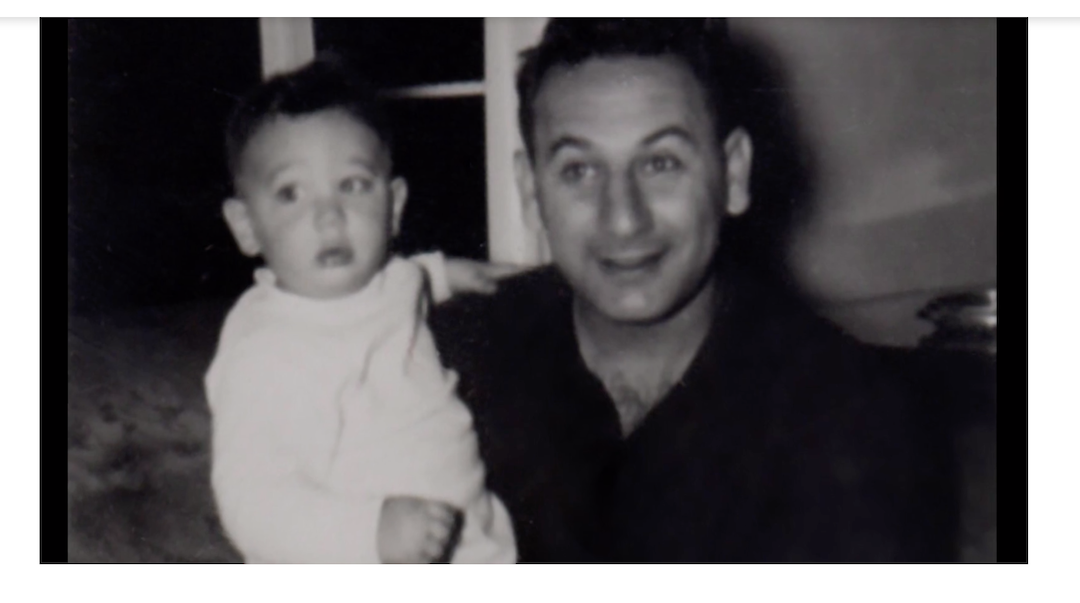
Paul Reubens and his father, Milton Rubenfeld, in a scene from “Above and Beyond,” a 2014 film about pilots like Rubenfeld who served in Israel’s War of Independence. (Playmount Productions)
His first feature film, “Pee-wee’s Big Adventure” (1985) was directed by Tim Burton (who would go on to direct “Beetlejuice” and one of the best of the “Batman” reboots) and was a financial and critical hit. A sequel, “Big Top Pee-wee” (1988), was less successful but had its moments.
From 1986 through 1990, Reubens starred in 45 episodes of the CBS Saturday-morning children’s program “Pee-wee’s Playhouse.” It was both a children’s show and a send-up of a children’s show, featuring a recurring cast of characters that included a sea captain (Phil Hartman), a cowboy (Laurence Fishburne), a “mail lady” (S. Epatha Merkerson) and a talking chair. More than one critic noted Reubens’ debt to Soupy Sales, another Jewish comedian whose 1960s kids show also managed to appeal to children as well as adults who were in on the joke.
The indecent exposure arrest led to a media frenzy that made it impossible for Reubens to continue playing a children’s entertainer. He eventually emerged in a series of cameos and small roles in film and television shows – including a memorable term as a grotesquely inbred Hapsburg prince on “30 Rock,” and as a drunken Pee-wee opposite Andy Samberg in a 2011 “Saturday Night Live” video.
In 2010, he revived the character that made him famous on Broadway in “The Pee-wee Herman Show,” and in 2016, he co-wrote and starred in the Netflix original film “Pee-wee’s Big Holiday.”
Reubens kept his health issues private. ““Please accept my apology for not going public with what I’ve been facing the last six years,” he said in a statement distributed by his publicist after his death. “I have loved you all so much and enjoyed making art for you.”
In a 1987 Rolling Stone interview, Reubens acknowledged those who said his act built on the Jewish comedians who came before him, including Eddie Cantor, the former vaudevillian who played a frenetic, wide-eyed innocent in a series of popular movie comedies of the 1930s.
“Jerry Lewis I saw when I was little,” he said. “Soupy Sales I probably saw when I was younger. I never knew who Eddie Cantor was until years later, when a lot of older people used to go [in an old Russian-Jewish furrier’s accent], ‘You’re like a young Eddie Cantor.’ I started to watch Eddie Cantor, and I could definitely see the resemblance. His movies are just incredible, very fantasy oriented and comedy oriented.”
JTA has documented Jewish history in real-time for over a century. Keep our journalism strong by joining us in supporting independent, award-winning reporting.
